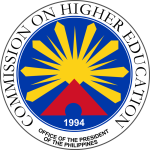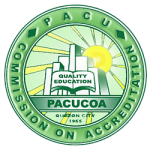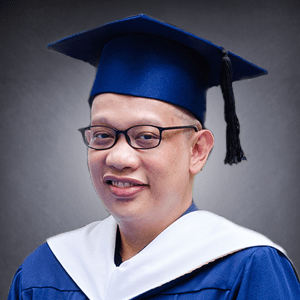The Director and Assistant Director of the Research Center for...
Read More
Announcements

Founded in 1929, the Bachelor of Arts in Journalism Program of the University of Santo Tomas (UST) is the oldest in Southeast Asia and is the top journalism program offered by a private higher education institution in the Philippines. UST journalism alumni run the newsrooms of the country’s top media organizations, such as the Philippine Daily Inquirer, Rappler, News5, the Philippine Star, and GMA News, and have joined regional and international publications such as Nikkei Asian Review and the Financial Times. Graduates have won major journalism awards, including the Society of Publishers in Asia Awards, the Jaime V. Ongpin Awards for Excellence in Journalism, and the Economic Journalists’ Association of the Philippines Awards.
UST’s B.A. Journalism Program is a four-year, thesis-track program that exceeds the minimum standards set by the Philippine Commission on Higher Education (CHEd). With up-to-date professional courses, electives, and cognates, the program is responsive to disruptions posed by technological upheavals and contemporary industry challenges such as the information disorder. In recognition of the quality of its faculty and instruction, as well as research and extension services, UST was named a Center of Development in Journalism by CHEd in 2013. The UST B.A. Journalism Program has Level 3 accreditation from the Philippine Association of Colleges and Universities’ Commission on Accreditation (Pacucoa). In 2022, it obtained the coveted certification of the Association of Southeast Asian Nations University Network Quality Assurance (AUN-QA), acing eight criteria: expected learning outcomes, program structure and content, teaching and learning approach, student assessment, academic staff, student support services, facilities and infrastructure, and output and outcomes.
For seven years beginning 2013, the UST B.A. Journalism Program, along with the B.A. Communication Program, won the School of the Year Award from the annual Philippine Student Quill Awards, given by the International Association of Business Communicators (IABC) – Philippines for communication excellence. Student-awardees have been cited numerous times for industry-level editorial and communication campaigns as well as communication management.
Students and faculty members regularly participate and present research papers in the Philippine Journalism Research Conference (PJRC), the National Conference of the Journalism Studies Association of the Philippines, the National Communication Research Conference (NCRC), the Asian Media and Information Center (AMIC) Annual Conference, the Media Education Summit, and the World Journalism Education Congress (WJEC). The program’s research agenda targets undergraduate and graduate theses, commissioned studies, faculty-directed/guided research and other research projects to contribute to the growing field of journalism studies. Works have appeared in journals and books such as Journalism Practice, the Routledge Companion to News and Journalism (Second Edition), the Pacific Journalism Review (Auckland University of Technology), and the Journal of Applied Journalism and Media Studies (Ingenta Connect Ltd.).
As part of UST’s internationalization efforts, the B.A. Journalism Program began a faculty and student mobility scheme with the University of Social and Media Culture of Torun, Poland in AY 2017-2018, and hosted the Manila leg of the Foreign Correspondents Study Tour of the University of Technology Sydney, one of Australia’s top journalism schools.
UST journalism faculty members hold advanced degrees and possess industry experience, most of them occupying mid- to top-level positions in metropolitan newsrooms. UST journalism faculty are also sought-after speakers in industry conferences and seminars, and have served as jurors in various journalism competitions. Faculty members are connected with major news organizations such as the Philippine Center for Investigative Journalism, ABS-CBN, GMA Network, TV5, the Philippine Daily Inquirer, the Philippine Star, and the Manila Times.
In 2024, the program was elevated to department status, a long-overdue recognition of its pioneering status and industry acclaim. As it approaches the Centennial of Journalism Education in the Philippines, the UST Department of Journalism will contribute to curricular innovations, insightful research, and high-impact outreach in the field, in pursuit of its mission to uphold the free and responsible press and to train the future of Philippine journalism.
Department Mission
The Department of Journalism of the University of Santo Tomas employs innovative, cutting edge, transdisciplinary, and integrative approaches to instruction, research, and extension in the fields of Journalism and Journalism Studies, producing ethical and socially responsible practitioners and scholars and upholding the free and responsible press.
Department Vision
The University of Santo Tomas’ undergraduate journalism program boasts of forward-looking and progressive course offerings devoted to the seamless integration of pedagogy, research, and extension in the fields of Journalism and Journalism Studies. It draws inspiration from UST’s Catholic identity and the Church’s teachings on Social Communication.

ASEAN University Network Quality Assurance Certification
(Bachelor of Arts in Journalism)

Center of Development
(Bachelor of Arts in Journalism)

Level III Accreditation
(Bachelor of Arts in Journalism)

School of the Year
The Director and Assistant Director of the Research Center for...
Read MoreFimilea Films, a production team formed by BA-Communication seniors, won...
Read More Sara Chinnasamy, Felipe Salvosa II and Christian Esguerra (2024).
Sara Chinnasamy, Felipe Salvosa II and Christian Esguerra (2024).
COVID-19 disinformation and fake news circulation—from the perspective of Global South Countries. In Ingrid Volkmer, Bruce Mutsvairo, Saba Bebawi, Ansgard Heinrich, Antonio Castillo (eds.). Ecologies of Global Risk Journalism: Conceptualizing Local Journalism in an Era of Deep Disruptions (pp. 79-98). Routledge.
 Sara Chinnasamy, Felipe Salvosa II and Christian Esguerra (2024).
Sara Chinnasamy, Felipe Salvosa II and Christian Esguerra (2024).
Managing mental health risks and safety: Practical experiences and challenges faced by Global South journalists. In Ingrid Volkmer, Bruce Mutsvairo, Saba Bebawi, Ansgard Heinrich, Antonio Castillo (eds.). Ecologies of Global Risk Journalism: Conceptualizing Local Journalism in an Era of Deep Disruptions (pp. 175-186). Routledge.
Kristine Anne Macasiray* and Jeremaiah Opiniano (2022).
The voices of students in the learning of journalism: Views from the Philippines. In Diana Garrisi and Xianwen Kuang (eds.). Journalism Pedagogy in Transitional Countries (pp. 167-196). Palgrave MacMillan.
 Sara Chinnasamy and Felipe Salvosa II (2022).
Sara Chinnasamy and Felipe Salvosa II (2022).
News reporting of the COVID-19 pandemic: Perspectives from the Global South. In Stuart Allan (ed.). The Routledge Companion to News and Journalism (Second Edition) (pp. 229-238). Routledge.
Jeremaiah Opiniano (2019).
Reporting on international migration. In Ann Luce (ed.). Ethical Reporting of Sensitive Topics (pp. 251-275). Routledge.
 Eliana Michaela Lacap, Jose Angelo Ycasiano and Nathaniel Melican (2025)
Eliana Michaela Lacap, Jose Angelo Ycasiano and Nathaniel Melican (2025)
The psychology behind misinformation: A correlational study on cognitive failure and worldview. Ethiopian Renaissance Journal of Social Sciences and Humanities, 12(2), 39–59. https://doi.org/10.4314/erjssh.v12i2.3
 Joanne Christine Ramos*, Matthew Dave Jucom*, Aris Jhon Galang* and Jeremaiah Opiniano (2025)
Joanne Christine Ramos*, Matthew Dave Jucom*, Aris Jhon Galang* and Jeremaiah Opiniano (2025)
The professional confidence of pandemic journalism graduates after their online education: analysis using the love and break-up letter method. Media Practice and Education, online first. https://doi.org/10.1080/25741136.2025.2522499

 Jessica Asprer*, Eleanor Marie Escalante* and Jeremaiah Opiniano (2024)
Jessica Asprer*, Eleanor Marie Escalante* and Jeremaiah Opiniano (2024)
What causes reticence in publicly correcting false information online? A case study from the Philippines. Romanian Journal of Communication and Public Relations, 26(2), 57–75. https://doi.org/10.21018/rjcpr.2024.2.595
 Areeya Tatjana Ho*, Ella Marie Mercado* and Jeremaiah Opiniano (2024)
Areeya Tatjana Ho*, Ella Marie Mercado* and Jeremaiah Opiniano (2024)
Pandemic-induced online internships as situated, bounded, inclusive learning: a Philippine mixed methods study. Media Practice and Education, online first. https://doi.org/10.1080/25741136.2024.2411644

 Neil Jayson Servallos*, Marie Carisa Ordinario and Katrina Isabel Gonzales* (2024)
Neil Jayson Servallos*, Marie Carisa Ordinario and Katrina Isabel Gonzales* (2024)
How COVID-19 ‘pseudo-events’ alter news decisions by Filipino journalists: A comparative case study. Journalism Practice, 18(1), 7-26. https://doi.org/10.1080/17512786.2023.2186924

 Jasper Emmanuel Arcalas*, Jhoana Paula Tuazon* and Jeremaiah Opiniano (2024)
Jasper Emmanuel Arcalas*, Jhoana Paula Tuazon* and Jeremaiah Opiniano (2024)
How journalists cope with news work’s stresses while remaining creative amid the COVID-19 pandemic: A phenomenological study. Journalism Practice, 18(1), 76-98. https://doi.org/10.1080/17512786.2022.2151039

 James Paul Gomez*, Rushelle Intia*, Charlene Grace Lao*, Karol Ilagan and Jeremaiah Opiniano (2023).
James Paul Gomez*, Rushelle Intia*, Charlene Grace Lao*, Karol Ilagan and Jeremaiah Opiniano (2023).
A survey on the determinants to using political memes as a journalistic tool by Filipino journalists.
Journal of Applied Journalism and Media Studies, https://doi.org/10.1386/ajms_00106_1
Felipe Salvosa II and Christian Esguerra (2022).
Reporting in the ‘new normal’: How the Covid-19 pandemic affected journalistic practice in the Philippines (Raportowanie w „nowej rzeczywistości”. Jak pandemia Covid-19 wpłynęła na praktykę dziennikarską na Filipinach). Fides, Ratio et Patria. Studia Toruńskie, 17, 290-306. https://doi.org/10.56583/frp.2262
Felipe Salvosa II (2021).
Learning outcomes in journalism education: Views from the industry, academe, and other stakeholders (Efekty kształcenia w edukacji dziennikarskie: opinie przedstawicieli świata mediów, środowiska naukowego oraz samych zainteresowanych). Fides, Ratio et Patria. Studia Toruńskie, 14, 226-248.

 Jeremaiah Opiniano, Joanna Christine Estorque*, Benjamin Joshua Gutierrez* and Jacob Martin Urmenita* (2021).
Jeremaiah Opiniano, Joanna Christine Estorque*, Benjamin Joshua Gutierrez* and Jacob Martin Urmenita* (2021).
The more prepared, the better: Analysing the internship performance of Filipino journalism students. Journalism Practice, 17(3), 624-646. https://doi.org/10.1080/17512786.2021.1929413

 Jeremaiah Opiniano, Rikka Alyssa Daquipil* and Patricia Isabella Romarate* (2020).
Jeremaiah Opiniano, Rikka Alyssa Daquipil* and Patricia Isabella Romarate* (2020).
Reflective practice in the news work of Filipino journalists: A grounded theory study. Journal of Applied Journalism and Media Studies, 10(3), 315-335. https://doi.org/10.1386/ajms_00031_1

 Jhoana Paula Tuazon*, Jasper Emmanuel Arcalas*, Janine Marie Soliman* and Jeremaiah Opiniano (2020).
Jhoana Paula Tuazon*, Jasper Emmanuel Arcalas*, Janine Marie Soliman* and Jeremaiah Opiniano (2020).
Journalists’ creative process in news work: A grounded theory study from the Philippines. Journalism: Theory, Practice and Criticism, online first: https://doi.org/10.1177/1464884920947909
Felipe Salvosa II (2020).
The digital new normal: Implications on journalism and journalism practice. The Antoninus Journal, 6, 1-3.
Felipe Salvosa II (2019).
Philippines: Three years under Rodrigo Duterte (Filipiny: Trzy lata rządów Rodrigo Duterte). Fides, Ratio et Patria. Studia Toruńskie, 10/11, 99-112.
Karol Anne Ilagan, Agatha Fabricante* and Christine Fabro* (2019).
Mirroring Duterte. Kasarinlan: Philippine Journal of Third World Studies, 34(1-2), 105-140.

 Paul Xavier Jaehwa Bernardo*, Tricia Lechuga* and Christian Esguerra (2019).
Paul Xavier Jaehwa Bernardo*, Tricia Lechuga* and Christian Esguerra (2019).
Ethical dilemmas of Filipino reporters during the 2016 Philippine presidential campaign trail: A phenomenology. SEARCH Journal of Media and Communication Research, 11(3), 23-40. https://fslmjournals.taylors.edu.my/wp-content/uploads/SEARCH/SEARCH-2019-11-3/SEARCH-2019-P2-11-3.pdf

 Jeremaiah Opiniano and Alexis Douglas Romero* (2019).
Jeremaiah Opiniano and Alexis Douglas Romero* (2019).
Media sustainability, ethics and democracy: Cases of Philippine media civil society organizations. Journal of Applied Journalism and Media Studies, 8(1), 91-114. https://doi.org/10.1386/ajms.8.1.91_1

 Aira Leigh Bagtas*, Karl Cedrick Basco*, Ralph Joshua Hernandez*, Elyssa Christine Lopez*, Jeremaiah Opiniano, Michael Carlo Rodolfo* and Anne Kathleen Vicho* (2018).
Aira Leigh Bagtas*, Karl Cedrick Basco*, Ralph Joshua Hernandez*, Elyssa Christine Lopez*, Jeremaiah Opiniano, Michael Carlo Rodolfo* and Anne Kathleen Vicho* (2018).
Journalism, journalism education and a region’s integration: The case of Southeast Asia. Pacific Journalism Review, 24(2), 189-217. https://doi.org/10.24135/pjr.v24i2.28

 Coren Dianne Martin*, Felipe Salvosa II, Christine Aura Exevea* and Pauline Tome* (2018).
Coren Dianne Martin*, Felipe Salvosa II, Christine Aura Exevea* and Pauline Tome* (2018).
Measuring the overall satisfaction of Filipino journalists on public information officers. Jurnal Komunikasi (Malaysian Journal of Communication), 34(4), 168-185. https://doi.org/10.17576/JKMJC-2018-3404-10

 Venice Nicole Amoroso*, Nicole Abigail Cham*, Paolo Mari Cruz*, Candice Ria Monsale*, Jeremaiah Opiniano, and Micah Gabriela San Jose* (2018).
Venice Nicole Amoroso*, Nicole Abigail Cham*, Paolo Mari Cruz*, Candice Ria Monsale*, Jeremaiah Opiniano, and Micah Gabriela San Jose* (2018).
#Trending: A re-evaluation of traditional news values given Twitter through a mixed methods approach. Jurnal Komunikasi (Malaysian Journal of Communication), 34(2), 166-187. https://doi.org/10.1386/ajms.8.1.91_1

 Jeremaiah Opiniano (2017).
Jeremaiah Opiniano (2017).
Pacific Journalism Review, 23(2), 26-50. https://doi.org/10.24135/pjr.v23i2.27
Jeremaiah Opiniano, Jasper Emmanuel Arcalas*, Mia Rosienna Mallari* and Jhoana Paula Tuazon* (2015).
Philippine community journalism: Roles, status and prospects. Community Journalism, 4(1), 29-36, Spring 2015 (joint issue with Grassroots Editor)

Inst. Jasper Emmanuel Y. Arcalas, MA
Master of Arts in Journalism

Inst. Kane Errol C. Choa, MA, MSc, APR
Master of Science in Media and Communication
Master of Arts in Communication

Inst. Alexis Carlo A. Corpuz, MA
Master of Arts in Journalism

Asst. Prof. Christian V. Esguerra, MA
Master of Arts in Theology, major in Social Pastoral Communication

Inst. Neil Jayson N. Servallos, MA
Master of Arts in Journalism